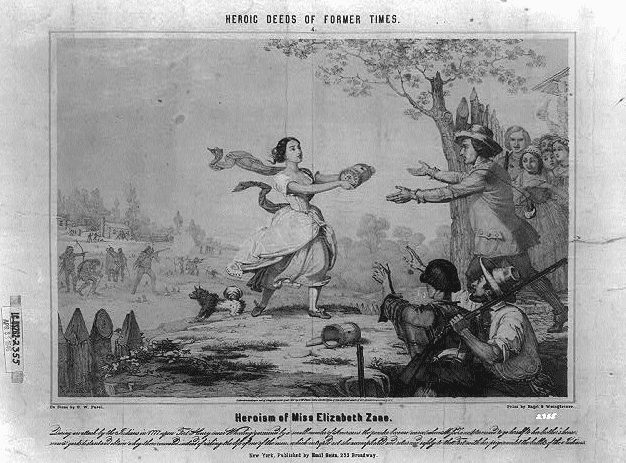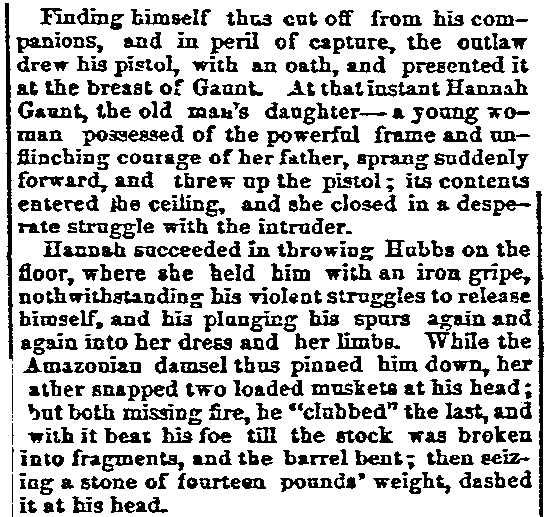Introduction: Gena Philibert-Ortega is a genealogist and author of the book “From the Family Kitchen.” In this blog article, Gena searches old newspapers to find stories of some brave American women and their deeds during the Revolutionary War.
When we think of the American Revolutionary War we reflect on the sacrifices and bravery exhibited by the men of the era. We tell the stories of heroes like George Washington and John Paul Jones. But what did women do during the Revolutionary War era? What were these early American women like? We tend to believe that they were “just housewives,” more “delicate” than women of a latter era. Sure, they were tough due to lack of technology, access to medical care, and the hardships they faced. But how tough were they?

When we look at our Revolutionary War foremothers, in some cases they were so tough that they kicked butt and didn’t bother to take names. Yes, that’s right. Our Revolutionary War-era foremothers were TOUGH!
Hannah Gaunt
My first introduction to this was from my own family history research: the story of Hannah Gaunt of South Carolina, daughter of Israel Gaunt who was a Quaker. Now let me set the scene for you. It seems that Israel was known to have some money. During the war, three Tories decided to go over to the Gaunt house to relieve Israel of that money. After sunset, the would-be robbers rode up to Israel’s home and asked for lodging. The Gaunts refused their request. One of the men, a guy named Hubbs, rode up to the kitchen door and asked Mrs. Gaunt for some water. When Mrs. Gaunt went to get the water, Hubbs jumped into action and entered the house. Mrs. Gaunt yelled to her husband so that he could lock the other doors, preventing the other two outlaws from getting in. Suddenly Hubbs drew his pistol and aimed it at Mr. Gaunt’s chest.
Now, let’s stop there. Here is Mr. Gaunt with a pistol to his chest while his wife and daughter look on, seemingly helpless. Two other outlaws who would do them harm are outside waiting for their chance to grab the family’s money. What do you do?
Well if you are Hannah Gaunt you leap into action: you wrestle the bad guy for his gun and pin him to the ground. According to this later 1859 newspaper article recounting the episode:
…she held him with an iron gripe [sic], notwithstanding his violent struggles to release himself, and his plunging his spurs again and again into her dress and her limbs. While the Amazonian damsel thus pinned him down, her father snapped two loaded muskets at his head…

Mary Hooks Slocumb
So was Hannah Gaunt the only woman who had a fighting spirit? Certainly not; we know that some women during the American Revolutionary War fought on the battlefields, while others protected their homes. Newspapers reported on these brave women’s exploits.
[search_box]
This 1851 newspaper article, a review of Mrs. Elizabeth F. Ellet’s 1850 three-volume book The Women of the American Revolution, recounts one of the stories from that book involving a very brave woman: Mary Hooks Slocumb. One night after having a dream where she saw her soldier husband injured from battle, she took to her horse and rode all night alone, approximately 60 miles, to reach the battle where her husband’s unit was. Although he was not one of the injured, many others were – and Mary ignored the sounds of cannon fire and tended to their needs. So that readers would not get the impression that Mary was anything but a lady, the article added:
Though Mrs. Slocumb could ride a horse, shoot a pistol, or take part in many masculine employments, she was not inattentive to many feminine duties…
Elizabeth Zane
Women volunteered to do all sorts of tasks to help the Revolutionary War effort, often at great risk. This 1849 newspaper article recounted the story of Elizabeth Zane’s bravery during a British attack on the American Fort Henry. After two days of holding the enemy at bay, the patriots were running out of gunpowder. They needed someone to run through enemy fire to a nearby block-house and retrieve more. At first, when asked, none of the men would volunteer. Finally a boy said he would do it, which of course prompted the men to volunteer. The men then started arguing about who should go – when the sister of Colonel Silas Zane (who was in the outside block-house) volunteered. Another of her brothers was in the fort, and he didn’t want her to run the risk.
The old newspaper article reports:
Her brother thought she would flinch from the enterprise, but he was mistaken. She had the intrepidity to dare, and the fortitude to bear her up in the heroic risk of her life.
Her brother tried to talk her out of it, but Elizabeth was resolute. She ran to the block-house unharmed, and then returned to the fort with the precious extra gunpowder through a volley of enemy bullets.
Mrs. Porter Philbrook
The bravery and heroism of American women during the Revolution continued to be discussed long after the fighting ended. Newspaper obituaries and memoirs noted those women and their acts of valor during the Revolutionary War period. Even latter-day women who displayed strength and cunning were likened to their Revolutionary mothers, as in this case involving an 1850 home burglary that resulted in the capture of the culprit by the lady of the house, Mrs. Porter Philbrook of Wilton, New Hampshire.
In telling of her bravery in apprehending a burglar while her husband was away, this 1850 newspaper article said she performed:
“a deed of daring”…which would not be unworthy of the bravest of the “women of the Revolution.”
As Mrs. Philbrook was preparing to retire for the night, she heard a noise and found a burglar breaking in – whom she confronted and subdued.
What did your Revolutionary War-era ancestress do? Probably more than you imagine. While you might think that these women sat at home and waited, more likely they were involved in something to assist in the war effort. In some cases they were true heroines.
Related Revolutionary War Articles:
- 27 Colonial Newspapers to Trace Your Early American Ancestry
- Tracing Your Colonial & Revolutionary Ancestry in Newspapers
- Top 7 Websites for Revolutionary War Genealogy
- Revolutionary War Genealogy (Pinterest board)
[bottom_post_ad]